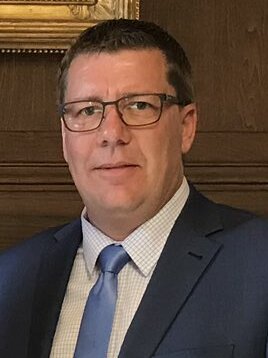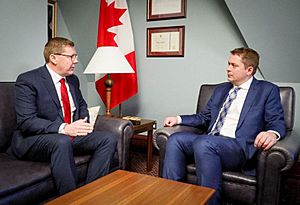Scott Moe facts for kids
Quick facts for kids
Scott Moe
MLA
|
|||||||||||||||||||||||||||||||||
|---|---|---|---|---|---|---|---|---|---|---|---|---|---|---|---|---|---|---|---|---|---|---|---|---|---|---|---|---|---|---|---|---|---|

Moe in 2019
|
|||||||||||||||||||||||||||||||||
| 15th Premier of Saskatchewan | |||||||||||||||||||||||||||||||||
| Assumed office February 2, 2018 |
|||||||||||||||||||||||||||||||||
| Monarch | |||||||||||||||||||||||||||||||||
| Lieutenant Governor |
|
||||||||||||||||||||||||||||||||
| Deputy |
|
||||||||||||||||||||||||||||||||
| Preceded by | Brad Wall | ||||||||||||||||||||||||||||||||
| Leader of the Saskatchewan Party | |||||||||||||||||||||||||||||||||
| Assumed office January 27, 2018 |
|||||||||||||||||||||||||||||||||
| President | James Thornsteinson | ||||||||||||||||||||||||||||||||
| Preceded by | Brad Wall | ||||||||||||||||||||||||||||||||
|
|||||||||||||||||||||||||||||||||
| Member of the Legislative Assembly of Saskatchewan for Rosthern-Shellbrook |
|||||||||||||||||||||||||||||||||
| Assumed office November 7, 2011 |
|||||||||||||||||||||||||||||||||
| Preceded by | Denis Allchurch | ||||||||||||||||||||||||||||||||
| Personal details | |||||||||||||||||||||||||||||||||
| Born | July 31, 1973 Prince Albert, Saskatchewan, Canada |
||||||||||||||||||||||||||||||||
| Political party | Saskatchewan | ||||||||||||||||||||||||||||||||
| Spouse | Krista Moe | ||||||||||||||||||||||||||||||||
| Children | 2 | ||||||||||||||||||||||||||||||||
| Residences | Shellbrook, Saskatchewan, Canada | ||||||||||||||||||||||||||||||||
Scott Moe (born July 31, 1973) is a Canadian politician. He is the 15th and current premier of Saskatchewan, which means he is the leader of the government in that province. He has held this role since February 2, 2018. He is also a member of the Legislative Assembly of Saskatchewan (MLA). An MLA is like a representative for a specific area, bringing the concerns of their community to the provincial government. He represents the area of Rosthern-Shellbrook. He was first elected in 2011.
Contents
Early Life and Education
Scott Moe was born in Prince Albert, Saskatchewan, and grew up on a farm near Shellbrook. After finishing high school, he briefly lived in Yellowknife before returning to Saskatchewan to attend the University of Saskatchewan. He studied agriculture and earned a Bachelor of Science degree.
Business career
While still at university in the mid-1990s, Scott and his wife started their own farming business. Over the years, he also owned gas stations and a pharmacy. After a period where his farming business faced financial difficulties, he worked selling farm equipment in Alberta before returning to Saskatchewan in 2003. Back home, he became involved in his community, working with groups like the Economic Development Corporation and a committee that helped attract doctors to rural areas.
Stepping into Politics
Scott Moe's journey into provincial politics began in 2011 when he was first elected as a Member of the Legislative Assembly (MLA) for the riding of Rosthern-Shellbrook.
After a few years as an MLA, Scott Moe was invited to join the provincial cabinet, which is a group of MLAs chosen by the Premier to lead different government departments. From 2014 to 2017, under the leadership of then-Premier Brad Wall, Scott Moe served in several important roles:
- Minister of Environment: He was responsible for protecting Saskatchewan's natural resources and dealing with environmental issues.
- Minister responsible for SaskWater and the Water Security Agency: These roles involved managing the province's water resources.
- Minister of Advanced Education: He oversaw colleges, universities, and other post-secondary education programs.
Leading the Saskatchewan Party
In August 2017, Premier Brad Wall announced he would be retiring, which meant the Saskatchewan Party needed to choose a new leader. Scott Moe decided to run for the leadership. His campaign focused on several key promises:
- Balancing the Budget: He aimed to make sure the provincial government spent no more money than it collected.
- Restoring Education Funding: He promised to put more money back into Saskatchewan schools.
- Tax Changes: He wanted to bring back a tax exemption on certain insurance products.
- Focus on Trade: He emphasized the importance of selling Saskatchewan's products to other countries and even suggested creating a new Ministry just for trade and exports.
- Fighting the Carbon Tax: He vowed to continue opposing the federal carbon tax.
On January 27, 2018, Scott Moe was elected as the new leader of the Saskatchewan Party. He won with 54% of the votes.
Premier of Saskatchewan (2018–Present)

Just a few days after becoming leader, Scott Moe was sworn in as the 15th Premier of Saskatchewan on February 2, 2018. As Premier, he is the head of the provincial government and leads the Saskatchewan Party.
Economic Policy
One of his first actions was to restore some education funding and bring back a tax exemption on certain insurance products. He also changed the Ministry of the Economy into the Ministry of Trade and Export Development, showing his focus on international trade. He has led trade missions to countries like the United States, China, India, Japan, and South Korea to promote Saskatchewan's products.
Environment
Moe's government has long opposed the federal government's carbon tax. They argued that the federal law was unconstitutional. In March 2021, the Supreme Court of Canada ruled that the federal carbon tax was constitutional. Following this, Saskatchewan began developing its own carbon pricing plan.
Moe's approach to climate and environment focuses on technology. This includes methods like carbon capture and storage. He also strongly supports building new pipelines. These are used to transport oil and gas.
Personal Life
Scott Moe is married to Krista Moe. They have two children.
Electoral History
| Year | Party | Votes | Seats | Position | ||||
|---|---|---|---|---|---|---|---|---|
| Total | % | ±% | Total | ± | ||||
| 2020 | Saskatchewan | 269,996 | 61.1% | –1.41% |
|
–3 | Majority government | |
| 2024 | 244,037 | 52.2% | –8.88% |
|
–14 | Majority government | ||
Fast Facts about Scott Moe
- Born July 31, 1973
- Raised on a farm near Shellbrook, Saskatchewan
- Education: Bachelor of Science in Agriculture from the University of Saskatchewan
- Scott is the oldest of five children.
- Moe enjoys fishing and golfing.
- First Elected as MLA: 2011 (for Rosthern-Shellbrook)
- Became Premier: February 2, 2018
- Political Party: Saskatchewan Party
- Current Role: 15th Premier of Saskatchewan
See also
- List of premiers of Saskatchewan
- Saskatchewan Party
 | Misty Copeland |
 | Raven Wilkinson |
 | Debra Austin |
 | Aesha Ash |

